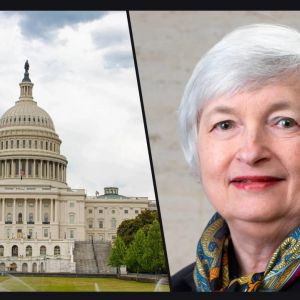Treasury Secretary Janet Yellen is wrapping up her tenure with a mic drop, overtly crediting President Joe Biden’s economic policies for putting the U.S. on stronger footing. Speaking to the New York Association for Business Economics, Janet praised decisions made under Biden’s watch as transformative. According to her, the U.S. economy is outperforming its global peers and defying gloomy predictions. “All policy choices entail tradeoffs, but the Biden administration made sound decisions that set the economy on a strong course,” she said. Janet stood firm, backing up her claim with data and outcomes, not fluff. While admitting inflation stung everyday Americans post-pandemic, Janet argued the $1.9 trillion American Rescue Plan stopped the U.S. from spiraling into chaos. She said, “The strength in the labor market and a rapid drop in unemployment helped us avoid ‘labor market scarring.’” That phrase, a favorite among economists, refers to the long-term damage caused when people stay unemployed for too long. Under Biden’s policies, that scenario didn’t play out. Labor market resilience under Biden Janet, a labor economist to her core, has always been obsessed with jobs. She pointed out that the administration’s laser focus on employment paid off big time. The unemployment rate plunged rapidly, allowing people to get back to work without the long-term scars that could cripple future economic output. She wasn’t blind to criticism, either. Critics of the American Rescue Plan have slammed it for fueling inflation, but Janet brushed that off, saying the benefits of the plan dwarfed its drawbacks. Her argument? The economy bounced back faster, workers stayed engaged, and the foundation of the labor market held strong. It wasn’t just about jobs, though. The plan was designed to help Americans who were on the brink, and Janet made it clear that leaving them to fend for themselves was not an option. The quick recovery, she emphasized, showed how critical it was to act decisively. Global challenges: China, Russia, and economic warfare Janet didn’t just deal with domestic issues. Her role required her to navigate an absolute minefield of international crises. From tense relations trade with China to Russia’s invasion of Ukraine, she was in the thick of it all. On China, Janet stepped into a mess left by Trump’s trade wars and other incidents, including a spy balloon saga that only added fuel to the fire. Despite the chaos, she managed to reestablish communication with Beijing, calling it “dangerous” to let ties with the world’s second-largest economy deteriorate further. “Obviously, we don’t agree with China about a lot of matters, and we have our grievances,” Janet said, making no attempt to sugarcoat the tension. Her efforts included high-stakes trips to China, where she made some headway. On one trip, senior Chinese officials even brought her a book she’d written about the U.S. economy to sign. But while diplomacy helped reopen lines of communication, Janet didn’t hold back from criticizing China’s manufacturing subsidies, which she said hurt American businesses. Then there was Russia. Janet led the charge to impose U.S.-led sanctions after Russia invaded Ukraine. These sanctions hit Moscow hard, curbing oil revenues and freezing assets. Yet, despite the heavy financial toll, the measures couldn’t entirely derail Russia’s economy or its military ambitions. Still, Janet saw value in multilateral efforts. She worked to bring allies on board, saying, “We have worked hard to rebuild our relationships with our allies and pursue objectives to the maximum extent jointly.” One particularly tense moment came when a cyberattack hit the U.S. branch of China’s largest bank, Industrial & Commercial Bank of China Ltd. The attack, traced to a Russian criminal gang, threatened to disrupt global financial markets. Janet acted fast, assuring Chinese officials that the U.S. was not behind the crisis and was working to resolve the situation before it spiraled out of control. Biden’s economic vision and Janet’s legacy Biden hasn’t been shy about framing his policies as a departure from his predecessor. Speaking recently, he said the U.S. was “stronger than four years ago,” citing economic stability and resilience after what he called “the worst attack on our democracy since the Civil War.” Janet shares those sentiments, pointing to the importance of multilateral strategies in tackling global and domestic challenges. Yet she admitted that the progress made under Biden could be at risk if Trump wins another term. Trump has already vowed to ramp up tariffs on China and slash U.S. support for Ukraine. Janet’s departure raises questions about what comes next. Her likely successor, Scott Bessent , has voiced support for her policies, including her “friend-shoring” strategy. This approach aims to align America’s supply chains with its allies, creating a stronger economic and security network. Bessent has called her doctrine “the most important speech in her distinguished career.” From Zero to Web3 Pro: Your 90-Day Career Launch Plan



















